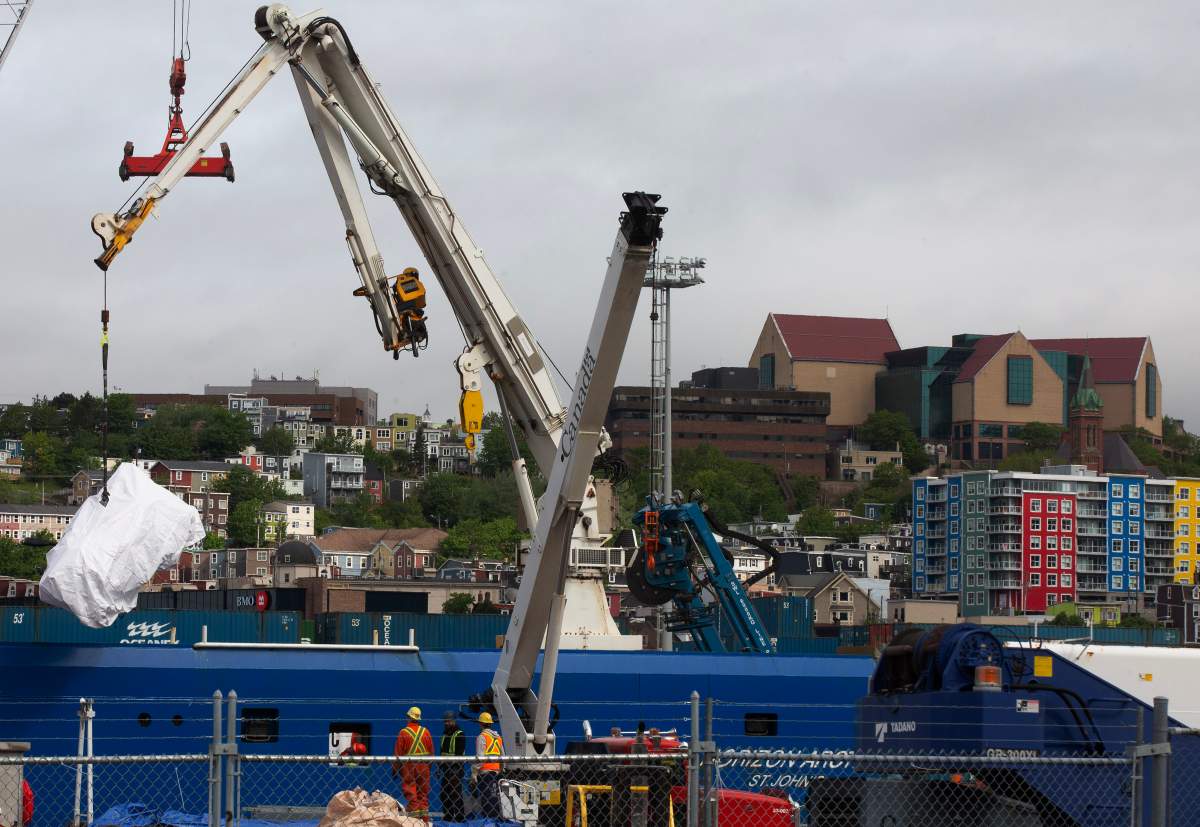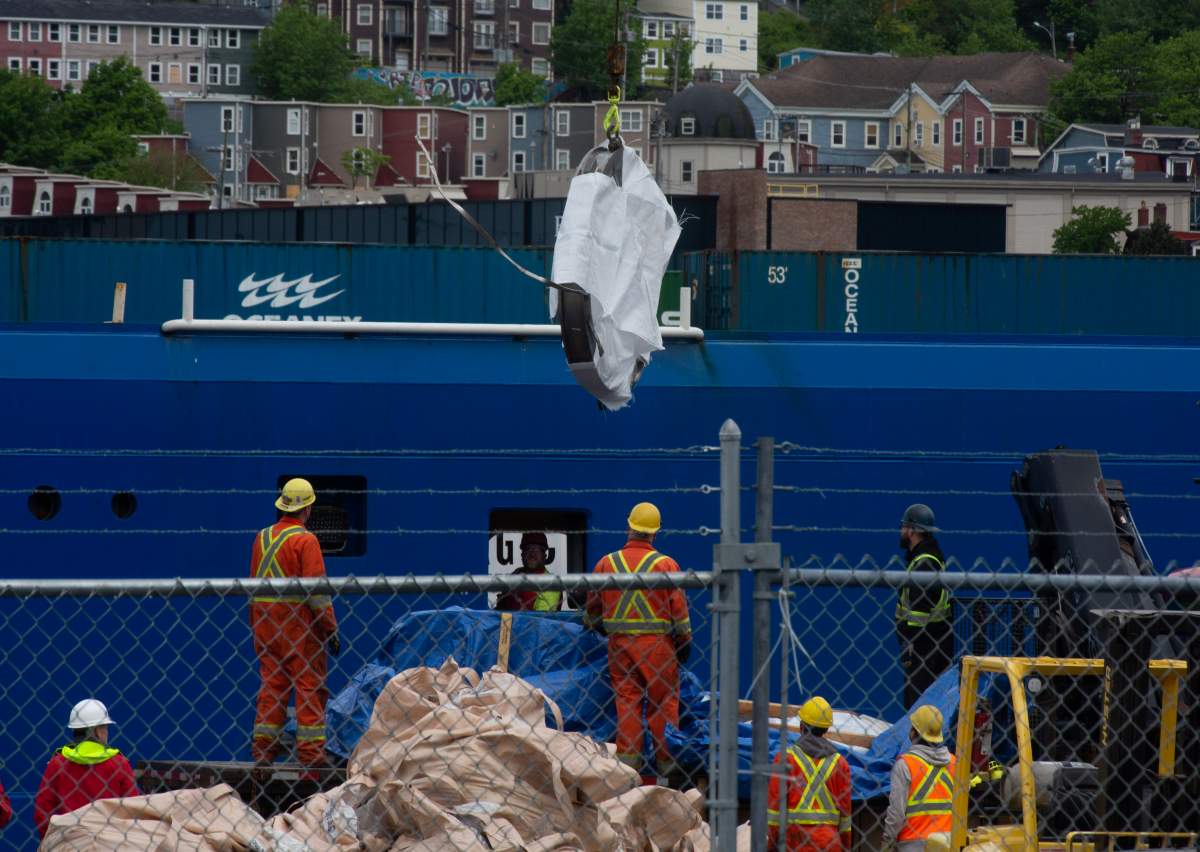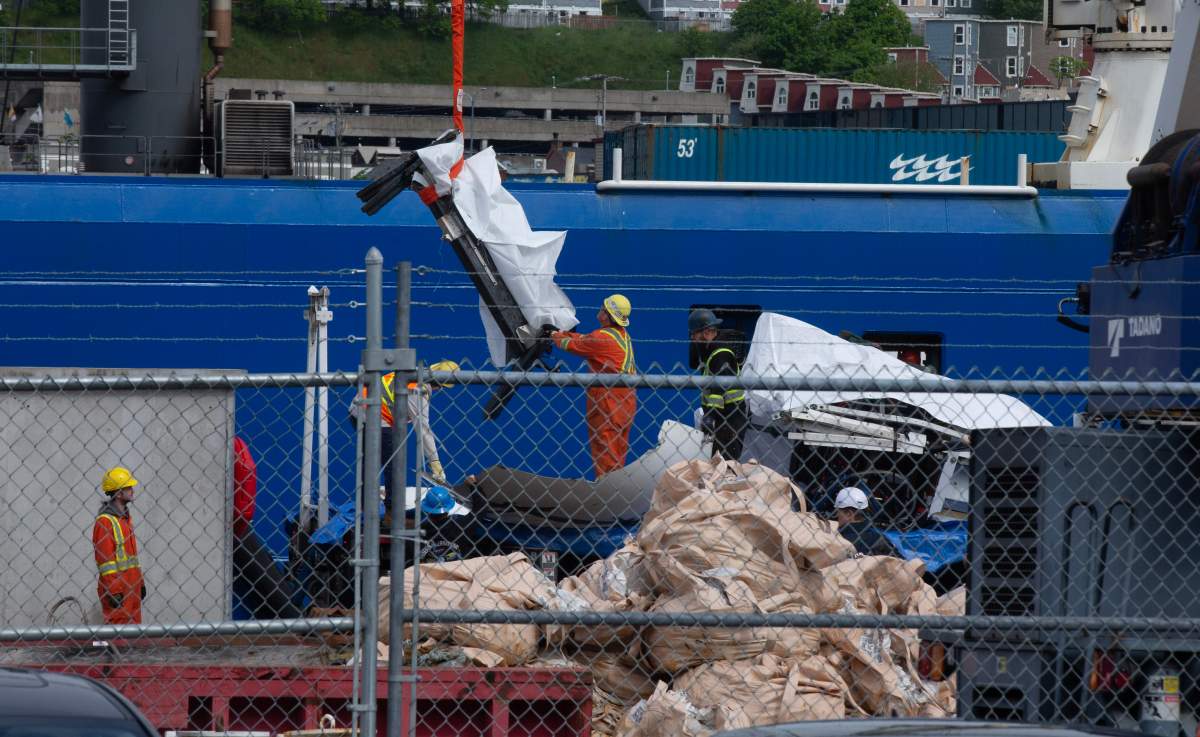The U.S. Coast Guard said Wednesday that medical professionals will analyze “presumed human remains” that have been recovered from the wreckage of the imploded Titan submersible.

The statement marks a change from earlier comments that suggested the remains of the five people aboard the doomed expedition to the wreckage of the Titanic may never be found.
Investigators are set to begin poring over the debris of OceanGate Expedition’s Titan submersible after the Canadian-flagged Horizon Arctic ship brought it and the remote-operated submersible used to retrieve it to port in St. John’s, N.L., earlier Wednesday.
The Titan submersible’s disappearance set off an international rescue mission that captivated the world’s attention given its link to the Titanic. As well, the five passengers were reported to have 96 hours of breathable air — an added element that led to the frantic search.

While there was hope the crew would be found alive, the U.S. Coast Guard confirmed last Thursday that searchers had found pieces of the Titan near the Titanic, and that it had suffered a “catastrophic implosion.”
At that time, officials could not say if it would be possible to recover the bodies of the passengers, due to both the nature of the implosion and the challenges facing the recovery team searching for debris on the ocean floor.
But Wednesday’s statement from the Coast Guard said the “presumed human remains” had been “recovered within the wreckage at the site of the incident” and will be analyzed.

Pelagic Research Services, an ocean services company whose remotely operated vehicle (ROV) has been used in the Titan search and recovery, said in a statement Wednesday it had successfully completed off-shore operations.
Its team “is still on mission and will be in the process of demobilization from the Horizon Arctic this morning,” the company said, adding a press conference would be held from its base in East Aurora, N.Y., at a later date.

Get breaking National news
“They have been working around the clock now for ten days, through the physical and mental challenges of this operation, and are anxious to finish the mission and return to their loved ones.”
The U.S. Coast Guard said its Marine Board of Investigation intends to transport the evidence by ship to an unspecified U.S. port where investigators will be able to conduct further analysis and testing.
In an earlier statement, Pelagic said its ROV, Odysseus 6K, was the vehicle that located the Titan debris field last week. It had made a number of dives to the Titan, and the ROV’s heavy lift capabilities were utilized in the operation.
Pelagic said the recovery phase at the bottom of the North Atlantic was a “remarkably difficult and risky operation.” The Titanic sits four kilometres below surface level, and the Titan’s wreckage was found as close as 500 metres away from the historic ocean liner.

Evidence is being collected in the port of St. John’s in coordination with Canadian authorities.
Given its global impact, several international agencies have launched their own investigations into the Titan’s implosion.
The Transportation Safety Board of Canada has begun an investigation and has been speaking with those who travelled on the Polar Prince, the Canadian-flagged ship that took Titan and its crew out to sea.
Board chairperson Kathy Fox said officials will share the information it collects with other agencies, such as the U.S. National Transportation Safety Board, which is taking part in the overall investigation.
RCMP have said officers will conduct a full investigation only if it appears that criminal, federal or provincial laws were broken.
The U.S. Coast Guard is investigating what led to the tragedy, as well as making recommendations to appropriate authorities to pursue civil or criminal charges, as necessary. It said a public hearing will be held based on evidence and witness interviews collected over the course of the investigation.
Marine investigation authorities in France and the United Kingdom are also probing the tragedy.
OceanGate Expeditions, the company that owned and operated the Titan, is based in the U.S. but the submersible was registered in the Bahamas. Meanwhile, those killed were from England, Pakistan, France and the U.S.
A key part of the investigations is likely to be the Titan itself. The vessel was not registered either with the U.S. or with international agencies that regulate safety, and it wasn’t classified by a maritime industry group that sets standards on matters like hull construction.
The investigation is also complicated by the fact that the world of deep-sea exploration is not well-regulated. OceanGate CEO Stockton Rush, who was piloting the Titan when it imploded, had complained that regulations can stifle progress.
U.S. maritime officials have said they’ll issue a report aimed at improving the safety of submersibles worldwide. U.S. Coast Guard chief investigator Capt. Jason Neubauer did not give a timeline for the investigation on Sunday, but said the final report will be issued to the International Maritime Organization.
Questions about the submersible’s safety were raised both by a former company employee and former passengers. Others have asked why the Polar Prince waited several hours after the vessel lost communications to contact rescue officials.
The Titan launched at 8 a.m. Eastern on June 18 and was reported overdue that afternoon about 700 kilometres south of St. John’s. It suddenly lost contact with the Polar Prince roughly an hour and 45 minutes after it submerged to descend for a view of the Titanic. It takes more than two hours to get to the wreck.
Killed in the implosion were Rush, two members of a prominent Pakistani family, Shahzada Dawood and his son Suleman Dawood, British adventurer Hamish Harding and Titanic expert Paul-Henri Nargeolet.
— with files from The Associated Press













Comments
Want to discuss? Please read our Commenting Policy first.